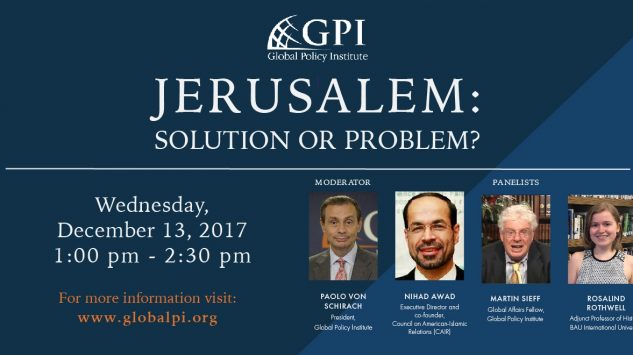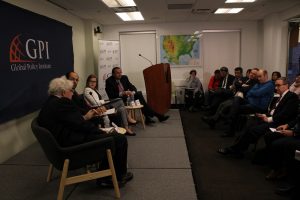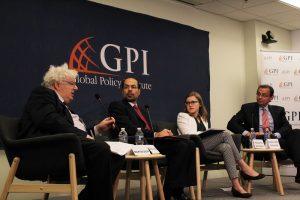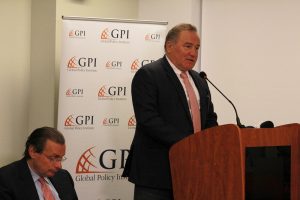Events

Trump reverses course on Jerusalem: what next?
December 13, 2017 – Is President Trump’s unexpected decision to recognize Jerusalem as the capital of Israel and subsequently move the U.S. Embassy from Tel Aviv to Jerusalem a real game changer? The President stated that his directive is simply an overdue acknowledgment of the facts on the ground. Since Jerusalem is the seat of the Israeli government –Trump stated– it is time for the international community to openly recognize this fact. This is all about realism.
But the international community strongly disagrees. Practically all world leaders condemned Washington’s decision and reaffirmed that the future status of Jerusalem should be decided by the outcome of (admittedly stalled) peace talks between Israel and the Palestinians. As a reaction to Trump’s move, the Organization of Islamic Cooperation met in Istanbul, condemned the U.S. policy change, and declared that East Jerusalem should be the capital of a Palestinian state.
At least for the moment it appears that this unilateral move by President Trump will widen the gap between the Arab and Muslim world and the U.S. and Israel. Trump stated in his White House announcement that his realism will spur the parties to find new common ground. How so? Besides, after this policy change, can America still credibly play the role of honest broker between the two sides?
All these issues were discussed during an event held on December 13, 2017 organized by The Global Policy Institute, a Washington think tank, in cooperation with BAU International University, titled Jerusalem: Solution or Problem?
After welcoming remarks by Sinem Vatanartiran, BAU President, Enver Yucel, Chairman of BAU Global, stated in a key note address that the U.S. decision has to be condemned because it is “against peace in the region and also against the norms of international law and justice”. He pointed out that all U.S. presidents, Democrats and Republicans, decided not to implement an unwise law passed by the U.S. Congress in 1995 which mandates moving the U.S. Embassy to Jerusalem. Trump’s decision, Yucel argued, seems to be motivated by short term domestic political interests, with no concern for the global ramifications. Yucel concluded that “Jerusalem deserves a bright future, where co-existence thrives within the nation”.
This keynote address was followed by a panel discussion featuring recognized experts moderated by Paolo von Schirach, President of the Global Policy Institute. The panelists included Nihad Awad, Executive Director and co-founder, Council on American-Islamic Relations (CAIR);Martin Sieff, Global Affairs Fellow, Global Policy Institute, and Rosalind Rothwell, Adjunct Professor of History, BAU International University. Rothwell set the stage by pointing out the complex history of Palestine under the British mandate and the contradictory British policies which tried to reconcile a desire to win the support of important Jewish communities via the momentous Balfour Declaration of 1917, while at the same time not antagonizing Arab communities.
Awad provided a vivid picture of the plight of the Palestinian people who lost land and possessions and who still live under Israeli occupation. He pointed out that this decision by Trump regarding Jerusalem shows how narrow domestic considerations have prompted this unfortunate policy shift.
Sieff argued that this is a terrible decision that will make everything worse. He also stressed that the outcome of the Istanbul meeting of the Organization of Islamic Cooperation and the strong condemnation by the 28 members of the European Union are illustrations of how Trump with this unwise decision managed to unite most of the world against America, and against Israel.
Panelists



Enver Yucel